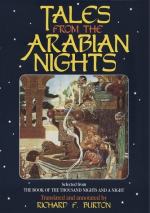Von Hammer some twelve years afterwards (Journ. Asiat August, 1839) brought forward, in his “Note sur l’origine Persane des Mille et une Nuits,” a second and an even more important witness: this was the famous Kitab al-Fihrist,[FN#142] or Index List of (Arabic) works, written (in A.H. 387 = 987) by Mohammed bin Is’hak al-Nadim (cup-companion or equerry), “popularly known as Ebou Yacoub el-Werrek."[FN#143] The following is an extract (p. 304) from the Eighth Discourse which consists of three arts (funun).[FN#144] “The first section on the history of the confabulatores nocturni (tellers of night tales) and the relaters of fanciful adventures, together with the names of books treating upon such subjects. Mohammed ibn Is’hak saith: The first who indited themes of imagination and made books of them, consigning these works to the libraries, and who ordered some of them as though related by the tongues of brute beasts, were the palaeo-Persians (and the Kings of the First Dynasty). The Ashkanian Kings of the Third Dynasty appended others to them and they were augmented and amplified in the days of the Sassanides (the fourth and last royal house). The Arabs also translated them into Arabic, and the loquent and eloquent polished and embellished them and wrote others resembling them. The first work of such kind was entituled ’The Book of Hazar Afsan,’ signifying Alf Khurafah, the argument whereof was as follows. A King of their Kings was wont, when he wedded a woman and had lain one night with her, to slay her on the next morning. Presently he espoused a damsel of the daughters of the Kings, Shahrazad[FN#145] hight, one endowed with intellect and erudition and, whenas she lay with him, she fell to telling him tales of fancy; moreover she used to connect the story at the end of the night with that which might induce the King to preserve her alive and to ask her of its ending on the next night until a thousand nights had passed over her. Meanwhile he cohabited with her till she was blest by boon of child of him, when she acquainted him with the device she had wrought upon him; wherefore he admired her intelligence and inclined to her and preserved her life. That King had also a Kahramanah (nurse and duenna, not entremetteuse), hight Dinarzad (Dunyazad?), who aided the wife in this (artifice). It is also said that this book was composed for (or, by) Humai daughter of Bahman[FN#146] and in it were included other matters. Mohammed bin Is’hak adds: —And the truth is, Inshallah,[FN#147] that the first who solaced himself with hearing night-tales was Al-Iskandar (he of Macedon) and he had a number of men who used to relate to him imaginary stories and provoke him to laughter: he, however, designed not therein merely to please himself, but that he might thereby become the more cautious and alert. After him the Kings in like fashion made use of the book entitled ‘Hazar Afsan.’ It containeth a thousand nights, but less than two hundred night-stories, for a single history often occupied several nights. I have seen it complete sundry times; and it is, in truth, a corrupted book of cold tales."[FN#148]




